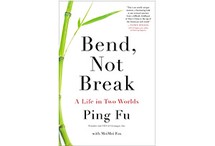New Memoirs So Powerful They’ll Turn Your Life Inside Out
You'll be swept away by these true stories; they'll make you think differently about your own experiences—past and present (plus two more we loved).

1 of 9
Bend, Not Break
By Ping Fu, MeiMei Fox
288 pages;
Penguin Portfolio
Gratitude is one of those "should" emotions. We should feel it all the time, but occasionally we have trouble accessing it—which is when you need to pick up Bend, Not Break by Ping Fu. The title of the memoir comes from a saying of the author's father about bamboo and its ability to move with the harsh wind instead of snapping under its pressure. The same is true for Ping, who has led one of the hardest and most remarkable lives of the past 50 years. Torn from her adoptive mother and father during the Cultural Revolution in China in the late '60s, she was forced to raise herself and her 4-year-old sister while living in a concrete room with no heat, food or adult supervision. Surviving on weeds and "bitter meals" concocted by Red Guards as punishment for her merchant-class background (think: animal manure, dirt, mold), Ping managed to not just get to Chinese university but also eventually make it to the United States, where she studied computer science and, among many other astonishing accomplishments, helped invent the first Web browser. Though knowing about her later real-life success helps you continue turning the pages of the brutal story of her upbringing, it doesn't keep you from weeping about her years of deprivation and thanking God that she was determined enough to survive—and soar. Most of all, you may end up seeing your own suffering and advantages in a new way. Take, for example, when Ping talks about her only possession, a red rock: "I would touch the stone to calm my nerves when I felt anxious or lonely," she writes. "It served as a reminder, then and now, of beauty in the world where so much around us is rough and crude." A devastating and transformative story.
— Leigh Newman
Published 12/26/2012


